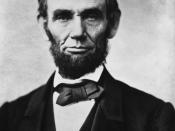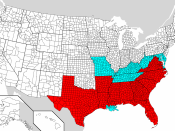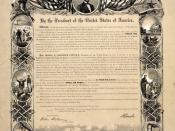Although Lincoln personally believed slavery to be an unfair and immoral institution, he claimed that he "was not, nor ever have been, in favor of bringing about in any way the social and political equality of white and black races," because he believed that keeping the Union together was more important than his personal beliefs. However, as the Civil War progressed, Lincoln was forced to re-evaluate his position on slavery and was enabled him to put forth what he had always personally wished for in the Emancipation Proclamation.
Before entering presidency, Lincoln had established in his presidential debates with Douglass that he was not advocating the abolishment of slavery, but merely trying to restrict it to the areas that currently practice the institution. He wished to prevent its expansion, but had no intention of touching slavery where it existed. Although in his opinion, Slavery was a much less effective institution for getting work done in comparison to free labor.
In a free society, not only was the need for overseers and violence reduced, but also the individual was self-motivated. This meant that free labor would be more productive than slavery for many reasons. Therefore, by preventing the expansion of slavery and promoting free labor, slavery would gradually become extinct. In addition to denouncing slavery to be a wasteful institution, Lincoln also asserted that slavery was fundamentally wrong and contradicting to the intentions of the founding fathers, but it must be emphasized that he never advocated the end of it.
So if Lincoln denounced slavery, why did he explicitly assure it's continuation? The reasons for denying the end to slavery are deeply rooted in political grounds. Lincoln was more intent on keeping the union together than freeing blacks. Even during the Civil War, his main goal was to save the...


